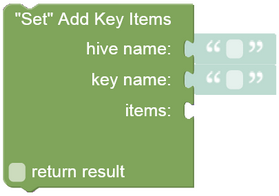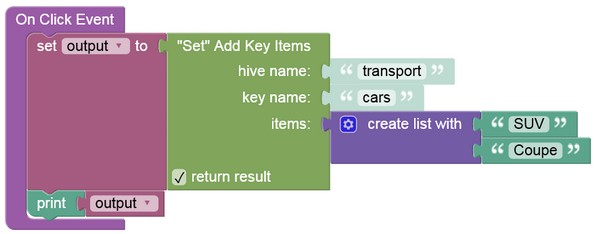Add Values¶
Description¶
This operation adds new elements to a set. Duplicate values are ignored.
Method¶
// Check A Single Value
Backendless.Hive(hiveName).SetStore(keyName).addValue(value): Promise<boolean[]>;
// Check Multiple Values
Backendless.Hive(hiveName).SetStore(keyName).addValues(values[]): Promise≪boolean[]>;
where:
| Argument | Description |
|---|---|
hiveName |
Name of a hive where the operation is performed. String value. |
keyName |
Key name identifying a set. String value. |
value |
A value to add to the set. The value can be of any data type. |
values |
An array of values to add to the set. Values can be of any data type. |
Return Value¶
Number of elements added to the set.
Example¶
Add a Single Value
The example below adds a new value 'SUV' to the 'cars' set.
await Backendless.Hive('transport').SetStore('cars').addValue('SUV')
where:
| Argument | Description |
|---|---|
'transport' |
Name of a hive where the operation is performed. |
'cars' |
Key name identifying a set. |
Add Multiple Values
The example below adds new values 'SUV' and 'Coupe' to the 'cars' set.
await Backendless.Hive('transport').SetStore('cars').addValues(['SUV', 'Coupe'])
where:
| Argument | Description |
|---|---|
'transport' |
Name of a hive where the operation is performed. |
'cars' |
Key name identifying a set. |
Codeless Reference¶

where:
| Argument | Description |
|---|---|
hive name |
Name of a hive where the operation is performed. |
key name |
Key name identifying a set. |
items |
A list of items to add to the set. |
Returns the number of elements added to the set.
Consider the following Set storage:
The example below adds "SUV" and "Coupe" to the "cars" set:
The set will look as shown below after the Codeless logic runs: